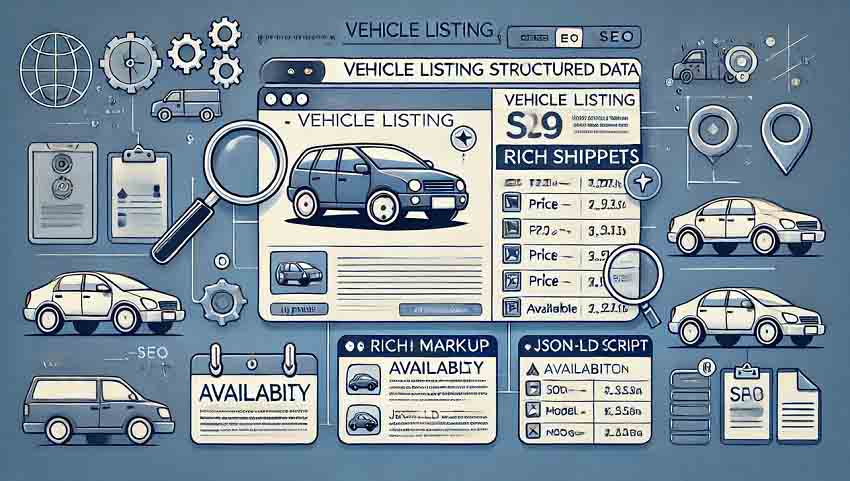Vehicle listing structured data is a type of schema markup specifically designed to provide search engines with detailed information about vehicles that are for sale. By implementing vehicle listing structured data, you can enhance your vehicle listings in search results, making them more informative and attractive to potential buyers.
Benefits of Vehicle Listing Structured Data:
- Enhanced Search Listings:
- Your vehicle listings can appear with rich snippets in search results, displaying key details such as price, availability, and condition.
- Increased Click-Through Rates:
- Rich snippets and enhanced search features make your listings stand out, potentially increasing click-through rates and driving more traffic to your website.
- Better User Experience:
- Providing detailed information upfront helps users find the vehicles they are interested in more efficiently, improving their overall experience.
Key Properties of Vehicle Listing Structured Data:
- @context and @type:
- Basic properties that define the context and type of structured data, typically set to
"@context": "http://schema.org"and"@type": "Car".
- Basic properties that define the context and type of structured data, typically set to
- name:
- The name or title of the vehicle listing.
- description:
- A brief description of the vehicle.
- image:
- A URL pointing to an image of the vehicle.
- brand:
- The brand or manufacturer of the vehicle.
- model:
- The specific model of the vehicle.
- vehicleCondition:
- The condition of the vehicle (e.g., new, used).
- price:
- The price of the vehicle.
- priceCurrency:
- The currency in which the price is listed.
- availability:
- The availability of the vehicle (e.g., InStock, OutOfStock).
- mpg:
- Miles per gallon or fuel efficiency of the vehicle.
- mileageFromOdometer:
- The number of miles the vehicle has been driven, typically in miles or kilometers.
- vehicleTransmission:
- The type of transmission (e.g., Automatic, Manual).
- color:
- The color of the vehicle.
- url:
- The URL where the listing can be viewed.
Example of Vehicle Listing Structured Data:
{
"@context": "http://schema.org",
"@type": "Car",
"name": "2024 Toyota Camry",
"description": "A reliable and fuel-efficient sedan with advanced safety features.",
"image": "https://www.example.com/images/toyota-camry.jpg",
"brand": {
"@type": "Brand",
"name": "Toyota"
},
"model": "Camry",
"vehicleCondition": "New",
"price": "25000",
"priceCurrency": "USD",
"availability": "InStock",
"mpg": "28",
"mileageFromOdometer": "0",
"vehicleTransmission": "Automatic",
"color": "Blue",
"url": "https://www.example.com/toyota-camry"
}
Implementing Vehicle Listing Structured Data:
To implement vehicle listing structured data, you need to embed the JSON-LD (JavaScript Object Notation for Linked Data) script into the HTML of your webpage. This script should include all relevant properties and values as shown in the example above.
By using vehicle listing structured data, you can significantly improve the visibility and attractiveness of your vehicle listings in search results, helping you reach more potential buyers and increase sales.
See Google Vehicle Listing Structured Data Reference
Optimize Your Vehicle Listings with Expert SEO Services!
Ready to make your vehicle listings stand out in search results? Our expert SEO services can help you implement vehicle listing structured data to boost your search rankings and attract more buyers. Visit our SEO Service page to learn how we can optimize your vehicle listings for maximum visibility and increased sales. Drive more traffic and convert leads into customers today!


